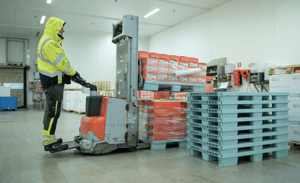The growing concern over plastic pollution and environmental degradation has led to the introduction of stringent EU regulations aimed at promoting sustainability. To comply with these regulations, businesses must adopt environmental and innovative solutions that prioritize reduction, reuse, and recycling. A critical component of this transition is the implementation of traceable plastic waste management systems, essential for moving towards a circular economy.
Introduction to Traceable Plastic Waste Management
Traceable plastic waste management involves monitoring and documenting the lifecycle of plastic products from production to disposal. This system ensures transparency and accountability, making it easier for companies to track their plastic waste and optimize recycling efforts. By adopting traceable systems, businesses can meet regulatory requirements, reduce waste, and improve resource efficiency. Ellen MacArthur Foundation - Traceability in Circular Economy
Transitioning to a Circular Economy
The current global plastics economy is highly linear, characterized by the production, use, and disposal of plastic products. This model has led to a dramatic increase in plastic waste, with significant environmental impacts. Transitioning to a circular economy is essential for mitigating these effects and promoting sustainable development. European Environment Agency - Circular Economy
In a circular economy, plastic materials are kept in use for as long as possible through practices such as recycling, repurposing, and reusing. This approach reduces the demand for new plastic production and minimizes waste. By adopting circular economy principles, businesses can contribute to a more sustainable and resilient plastics economy. World Economic Forum - The Circulars

The Role of Innovation in Meeting EU Regulations
To meet the upcoming EU regulations, businesses must embrace innovative solutions that enhance sustainability and efficiency. Key strategies include:
- Advanced Recycling Technologies: Investing in advanced recycling technologies, such as chemical recycling, can help businesses process complex plastic materials that are difficult to recycle mechanically. These technologies break down plastics into their basic chemical components, allowing for the creation of high-quality recycled materials. Circle Economy - Advanced Recycling
- Digital Product Passports: Implementing digital product passports provides detailed information about a product's composition, lifecycle, and recyclability. This innovation supports traceable plastic waste management and helps businesses comply with regulations by ensuring that plastics are processed and repurposed effectively. Deloitte - Digital Product Passports
- Eco-Design and Sustainable Packaging: Designing products with sustainability in mind is crucial for reducing plastic waste. Eco-design principles focus on creating products that are durable, repairable, and recyclable. Additionally, sustainable packaging solutions, such as biodegradable and compostable materials, can significantly reduce the environmental impact of plastic waste. StartUs Insights - Eco-Design in Packaging
Conclusion
Complying with upcoming EU regulations on plastics requires a combination of environmental and innovative solutions. By adopting traceable plastic waste management systems and embracing circular economy principles, businesses can reduce their environmental impact and promote sustainability. Investing in advanced recycling technologies, digital product passports, and eco-design is essential for meeting regulatory requirements and achieving long-term success. Embracing these strategies will not only help companies comply with regulations but also position them as leaders in sustainability and innovation.
For more detailed insights and the latest updates on sustainable plastic solutions, visit the European Commission, World Economic Forum, and Circle Economy.


